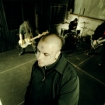"True nu-metal keeps its finger on the pulse. It's not just looking at things in the mainstream. It's exhausting all there is to consume."
Gustavo Hernandez, frontman of nu-metal revivalists Omerta, doesn't mince words when it comes to the genre — and he backs up his declarations.
The vocalist's statement of creative open-mindedness and hunger to stay ahead of the zeitgeist informs every aspect of his Houston band's aesthetic: from the grotesque figures and frantic scribbles adorning their record covers to the hyperactive, genre-splicing mix of metal, rap and avant-garde that makes up their next-gen sound.
Omerta's audacious, visceral and often-polarizing musical assault — along with their outsized, irreverent attitude — has driven the five-piece's rapid ascent and placed them at the forefront of the scene, where they're proudly waving the flag of their self-proclaimed (if tongue-in-cheek) title: "America's most hated boy band."
And if Omerta get their way, they're about to add a lot more haters to their list.
"We had to go all the way," says Vincente Void, Omerta's producer, songwriter and "unofficial sixth member." "There was no half-assing this."
Void is describing Omerta's distinctive creative direction and album art (courtesy of artists Daisuke Ichiba and Techn0rganism), but this sentiment can just as easily be applied to the band's 2020 debut Hyperviolence.
The album — a metalcore maelstrom laced with nu-metal mayhem — immediately endeared the band to fans, earned them an endorsement from nu-metal kingmaker Ross Robinson (the producer who broke Slipknot, Korn and Limp Bizkit) and scored them cred-boosting gigs opening for Knocked Loose and Dying Wish.
The buzz around Omerta is real and rising fast. And with their forthcoming album Suicycle, the band — also featuring Han Kim (guitar, vocals), Carlos Pertuz (guitar), Justin Zorn (bass) and Daniel Garcia (drums) — are poised to make good on the hype and live up to their own sky-high ambitions.
It's no wonder, given the energetic spirit that defines Omerta, that the dynamic between Hernandez and Void originated in childhood. In high school, Hernandez knew Void as one of the only kids who shared a familiarity with heavy music, and asked him to help produce Hernandez's early beatdown band.
That band flamed out, but the pair's bond was secured. When Hernandez later started making crossover thrash demos, he naturally shared them with Void — who hit him with some honest, if brutal, feedback: "I didn't think sounding like a Power Trip or a Vulgar Display rip-off in 2017 was going to work," Void recalls telling the singer.
He then offered Hernandez a different holistic vision for the project focused on future-proofing it for limitless expansion. "As you grow and evolve as a person, the band can also have that ceiling to grow and evolve alongside you and can adapt to the ever-changing music industry."
Hernandez took the critique seriously (he now looks back on those thrash demos as "godawful"), and they set out to create a new expansive sound. Back then, Void — still cynical over the dissolution of his own nu-metal-meets-metalcore project Darke Complex — was "over the whole heavy-music thing," so Omerta's initial sound skewed way more melodic, closer to grunge and J-rock.
It wasn't until Hernandez discovered Code Orange's Forever and Vein.fm's Errorzone — as well as dynamic rappers like Lil Darkie and his Spider Gang collective — that the puzzle pieces clicked.
He knew exactly what he was looking for: "It's the feeling of your skeleton vibrating in your skin," Hernandez says. "It's the feeling of wanting to run through a wall. Complete angst and anger — this unfiltered energy."
Omerta eventually harnessed that unfiltered energy to create a sound that evokes System of a Down's manic aggression, Ghostemane's dark flows and Circa Survive's post-hardcore melodicism (often in one song). They pair this nasty attack with unflinching, and often violent, lyrical themes.
On "Garbage," one of Hyperviolence's standouts, Hernandez raps, "You hate me, bitch?/I hate me, too/Tell me, what the fuck am I supposed to do?/Unload a fucking clip and see my brain cells ooze?"
"Though gratuitously obscene, [the lyrics] are an expression of the truest and rawest emotions we felt," Void says. "They're not supposed to be pretty or respectful. But they're honest."
That kind of fearless honesty — whether addressing first-hand experiences with racist bullies ("Payback") or surviving sexual abuse ("i luv u") — helps Omerta resonate with fans in a profound way. It also provides moments of welcome catharsis for the band and is a crucial component in their platform for broader artistic revolution.
"Part of our mission is to challenge the expectations of what you think art should be," says Hernandez. "That's what violent art is. It's our way of destroying the industry around us to build something beautiful, something new, on top of what's been blown to pieces."
After releasing Hyperviolence, Omerta quickly caught the attention of the underground heavy-mu-sic scene — as well as some big-time tastemakers. Out of the blue, nu-metal godfather Ross Robinson slipped into their DMs with some fawning messages and a surprising request to sit in on their practice.
Though Hernandez and the others were terrified to host the iconic producer ("I was like, 'We're about to be murdered,'" he jokes), their fears were ultimately unfounded. Robinson made it five seconds into the band's first song before physically stopping them to say he was all in.
Hernandez still speaks about the moment with disbelief: "All the stars were beginning to align for us."
As prominent players in this decade's nu-metal revival, Hernandez and Void are deeply opinionated about the scene — and its potential for boundary- breaking expansion. As such, Omerta are eager to incorporate everything from rhythm-game music to hyperpop into their metal.
It's that outlook that feeds into one of Omerta's current fascinations: K-pop. "It's the most genre-agnostic genre right now," says Hernandez. Void mentions that he's paid close attention to how K-pop megastars BTS market themselves in the current music landscape, which demands a more active consideration of image.
From this, Void started using an attention-grabbing shorthand for Omerta: "America's most hated boy band." He saw it as a means to make the band appear more accessible, even if it was slightly misleading: "It's about Trojan-horsing your way into the ears of people who may not otherwise give you a chance."
When Revolver pivots to a question about Suicycle, the highly anticipated follow-up to Hyperviolence, Hernandez starts laughing maniacally. He's come to expect this question in every interview since the band first teased the album and dropped the glitchy shredder "Antiamorous" in April 2023.
And though Omerta are still tinkering with the record when we speak, Hernandez and Void are eager to talk up how it's poised to kick the band into another gear.
"Where Hyperviolence was raw aggression and outward angst," Hernandez says, "Suicycle is the inverse." Suicycle looks to move Omerta even further from the rigidity of being a "metal" band, as they dive deeper into new genres and incorporate more expectation-defying sounds.
"Antiamorous," then, made sense to drop first because the band sees it bridging these two eras of Omerta. "But even then," Hernandez continues, "'Antiamorous' is so far removed from everything else you're about to hear."
Regardless, Hernandez says one thing is certain: "It's going to be a very jarring and polarizing experience." That's always been the Omerta promise.












